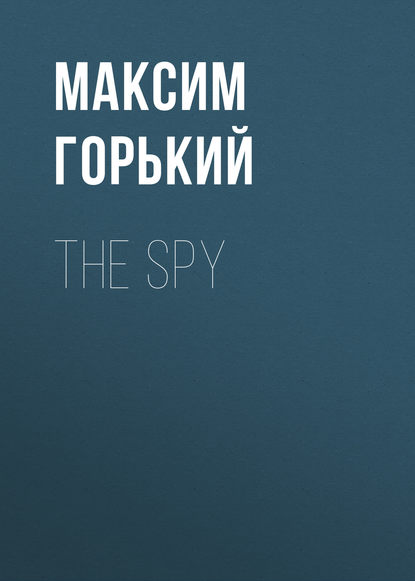По всем вопросам обращайтесь на: info@litportal.ru
(©) 2003-2024.
✖
The Spy
Настройки чтения
Размер шрифта
Высота строк
Поля
Olga bent her head to look into Klimkov's face.
"Have you ever been here before?"
"No. This is the first time."
"Do you find it interesting?"
"Yes, I like it."
He walked to her side trying for some reason to lift his feet higher; by which walking became awkward. They sat down at a table, and called for beer. Yakov made jokes, while Makarov whistled softly and regarded the public with his screwed-up eyes.
"Have you any companions?" asked Olga.
"No, not one."
"That's what I thought at once. I thought you were a solitary person," she said smiling. "Lonely people have a peculiar gait. Altogether there's something noticeable about them. How old are you?"
"I'll soon be nineteen."
"Look, there's a spy!" Makarov exclaimed quietly.
Yevsey jumped to his feet, but quickly resumed his seat, and looked at Olga to see if she had observed his involuntary movement of alarm. He could not make out, however. She was silently and attentively examining Melnikov's dark figure, which slowly moved through the passageway between the tables as if with an effort. Melnikov walked with bent neck and eyes fastened on the ground. His arms hung at his side as if dislocated.
"He walks like Judas to the aspen tree," said Yakov in a subdued voice.
"He must be drunk," observed Makarov.
"No, he's always like that," was on the tip of Yevsey's tongue. He fidgetted in his chair.
Melnikov pushed himself through the crowd like a black stone, and was soon lost in its gaily colored stream.
"Did you notice how he walked?" Olga asked Klimkov.
Yevsey nodded his head.
"Of course he's a mean man, but he must be unhappy and lonely."
Yevsey raised his head, and looked at her attentively, with expectation.
"Do you know I think that for a weak man loneliness is the most horrible thing. It can drive him to anything."
"Yes," said Klimkov in a whisper, comprehending something. He looked into the girl's face gratefully, and repeated in a louder tone, "Yes."
"I knew him four years ago," Makarov recounted. Makarov's face seemed suddenly to have lengthened and dried up. His bones became visible, his eyes opened and darkened and looked firmly into the distance. "He delivered over one student, who gave us books to read, and a workingman, Tikhonov. The student was exiled, Tikhonov stayed in prison about a year, then died of typhus."
"Are you afraid of spies?" Olga suddenly asked Klimkov.
"Why?" Yevsey returned dully.
"You started so when you saw him."
Yevsey rubbing his throat vigorously answered without looking at her:
"That was – because I know him, too."
"Aha!" Makarov drawled, smiling.
"Ah, and such a quiet fellow!" exclaimed Yakov.
All now moved more closely around Klimkov as if desiring to hide him from somebody's eyes. He did not understand their exclamations, nor their movements and kind looks. He endeavored to keep quiet, fearing that against his will he would say words that would at once destroy the anxious yet pleasant half-dream of these minutes.
The fresh spring evening approached quietly and benignly, softening sounds and colors. There was a red flush in the sky, and the brass instruments sang a soft pensive strain.
"Well," said Makarov, "are we going to stay here, or are we going home?"
"What will they give here?" asked Olga.
"Chorus singing, tight-rope dancing, and all sorts of similar nonsense."
They decided to go home. On the way Olga asked Klimkov:
"Have you ever been in prison?"
"Yes," he answered, but in an instant added, "Not for long."
They took the tramway to their place of destination. Yevsey found himself in a little room with blue paper on the walls. It was close and stifling, now merry, now gloomy. Makarov played the guitar and sang songs which Yevsey had never before heard. Yakov boldly discussed everything in the world, laughing at the rich and swearing at the officials. Then he danced, filling the whole room with the tread of his feet and the cries and the whistling that accompany the dances. The guitar tinkled the measure of the dance, and Makarov encouraged Yakov with popular sayings and shouts.
"Go ahead, Yasha! Heigho! Who with merriment is blessed, Frightens sorrow from his breast."
Olga looked on serenely and contentedly.
"Good, isn't it?" she asked Klimkov occasionally, smiling at him.
Drunk with a quiet joy unknown to him Klimkov smiled in response. He forgot about himself, and felt the obstinate pricks within him only rarely, for a few seconds at a time. Before his consciousness was able to transform them into clear thought, they disappeared, without recalling his life to him.
It was not until he had reached his home that he remembered his work, his obligation to deliver these merry people into the hands of the gendarmes. On recalling this duty he was seized with cold anguish. He stopped in the middle of the room, his brain a void. Breathing became difficult, and he passed his dry tongue over his lips. He drew off his clothes quickly, and clad in nothing but his underwear seated himself at the window. After several minutes of numbness he thought:
"I will tell them – her – Olga."
But that very minute he heard in his memory the angry and contemptuous shouts of the joiner, "Vermin!" Klimkov shook his head in repudiation of the idea. "I'll write to her. 'Take care,' I'll say – and I'll write about myself."
This thought cheered him. The next minute, however, he reasoned:
"They'll find my letter when they make the search. They'll recognize my handwriting, and then I'm ruined."
Someone within him commanded imperiously:
"You can't do anything of yourself. Do that which you have been bidden to do."

















